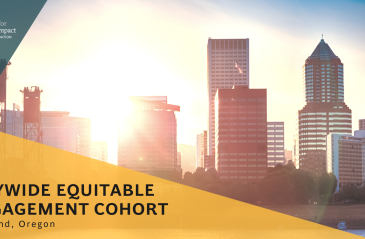
Five things we recently learned about difficult conversations

With Lebanese civilians protesting publicly about their government’s performance, @SJ_Noujeim looks at what can be done #FindingLegitimacy
Share articleFailing public services and political deadlock are twin problems facing Lebanon, says @SJ_Noujeim. But all is not lost... #FindingLegitimacy
Share articleGreater transparency and engaging citizens in decision-making help Lebanon's govt find legitimacy, says @SJ_Noujeim #FindingLegitimacy
Share articleWe put our vision for government into practice through learning partner projects that align with our values and help reimagine government so that it works for everyone.
There is no doubt that trust is a key factor in legitimacy - but that doesn't guarantee its presence in public discourse.
In Lebanon, for example, citizens are often sceptical about the ability and willingness of policymakers to make decisions for the public good over private interests. About a year ago, in March 2017, around 2,000 people occupied Beirut's Riad al-Solh Square to protest against parliament's proposed tax hike for funding public sector pay rises.
The tax hike came in response to a series of strikes by members of the public administration demanding pay rises, however, it was perceived as unfair because the government had shown a lack of fiscal transparency and provided little in return for the high taxes it imposed. Lebanon had not passed a state budget for 12 years at the time of the tax hike proposition, and the first state budget in more than a decade was only passed later that year in October.
This was not the first time that Lebanese civilians had protested publicly about their government's performance. An earlier wave of demonstrations had begun in 2015 in response to the refuse crisis, which had seen mountains of rubbish filling the streets of Lebanon. However, despite the protests and the urgent need to end the refuse crisis, policymakers still haven't managed to put in place a sustainable waste management solution to date.
Instead, they are negligently allowing more than 150 rubbish dumps across Lebanon to openly burn trash at least once a week. This poses a severe health risk and means that people living near to a refuse site are inhaling dangerously high levels of smoke. In addition, rubbish is being dumped into the Mediterranean, further polluting the already polluted water, due to the common practice of throwing untreated sewage and chemicals into the sea.
The refuse crisis is only one of the many problems afflicting Lebanese citizens as a result of poor standards of municipal services, infrastructure and utilities.
In Lebanon, electricity outage is the norm and is particularly alarming outside the capital, Beirut, with some areas of the country receiving electricity for only a few hours a day. The failure of the government to provide round-the-clock electricity has led to the creation of the “generator mafia” - a group of individuals supplying more expensive, unregulated electricity through diesel-run generators. According to World Bank estimates, household spending on electricity in Lebanon in 2013 amounted to US$1,300 on average, with two-thirds spent on generators, despite the fact that the gross national income per capita is only US$9,800.
Other problems include a lack of health coverage, with only about half the population covered by any form of health insurance. The remaining half rely on the support of the Lebanese Ministry of Public Health, which has proved to be unreliable, often lacking funding and resources. Furthermore, Lebanon is suffering from below average state education, forcing many parents to place their children in private schools - if they can afford to do so.
Lebanon has been a safe haven for more than a million refugees since the outbreak of the Syrian civil war in 2011. It currently has the highest per capita number of Syrian refugees, accounting for about a quarter of the total. It is therefore not immune to the difficulties faced by host countries, and the arrival of such large numbers of refugees, without a clear government plan, has increased the burden on the country's failing infrastructure and limited resources. It has also placed additional stress on local civilians, who feel that they are competing with refugees for often scarce employment opportunities.
Despite a long history of democracy, the political system in Lebanon has been suffering from paralysis. In November 2014, the Lebanese parliament voted to extend its own mandate until 2017, due to the inability of members to agree on a new electoral law. This move was condemned as unconstitutional by the European Union and was the second deferral of parliamentary elections, which had been due to take place in June 2013. A third deferral of 11-months followed in June 2017.
As a result of these factors, it is perhaps unsurprising that in 2015 Lebanon witnessed the creation of several protest movements, such as YouStink and Badna Nhaseb, and it has since experienced a series of protests against government performance and the lack of provision of basic services. Frustrations among ordinary citizens, who feel that the ruling political class is failing to deliver a well-functioning government, has also led to the creation of Beirut Madinati - a citizen-centric electoral platform in Beirut - which ended up winning 40% of the votes in the municipality elections just a few months after its formation.
Lebanon is set for parliamentary elections next month, despite recent complications such as the mysterious resignation of the Lebanese prime minister, Saad Hariri, delivered from Riyadh in November 2017. (Hariri later withdrew his resignation.) Among the political parties with these elections in their sights is Sabaa - a young nationwide organisation created to provide a new national and multi-confessional platform with citizen-centic programme clearly mapped to the UN's 2030 Sustainable Development Goals. Sabaa is not alone in this political journey as more than seven civil groups joined forces to form one of the largest national coalitions with unified electoral lists across the country to oppose the existing political class.
Policymakers have a lot to prove in the next elections and beyond in order to re-establish trust and bridge the gap between themselves and the Lebanese people. First, they need to increase government transparency by being open and honest with citizens about the progress of policies and the reasons for their outcomes, and by ensuring fiscal transparency and accountability.
Second, they need to commit to finding solutions that address citizens' concerns and improve the local economy. One way to do this is through engaging citizens in the decision-making process. For instance, they should take more seriously the reforms proposed by civil groups, engage with them proactively to identify policy solutions, and update them on the progress of relevant discussions. An important pre-requisite to executing solutions is fighting corruption within public departments and should, therefore, be a top priority.
Finally, policymakers need to show that they are capable of leading a nation in the age of digital revolution by demonstrating an understanding of the impact of digitisation and open data on the role of government. If civil activism maintains its momentum in Lebanon, real change could start to take place in the next elections and continue into the future, bringing politicians and citizens closer together as a result.
What is legitimacy to you? Where do you see legitimacy working well? How governments work with citizens to build legitimacy is a big question for CPI.
Find out how to get involved in our Finding Legitimacy project











